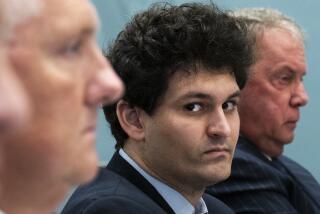‘From Generosity to Cynicism’
- Share via
Marcel Ophuls’ column (“Going From Generosity to Cynicism,” Opinion, Oct. 30) seems to suggest that post-World War II Americans and their government were perhaps more generous or kind than their modern counterparts because they entered into the Marshall Plan and other relief programs under the pretense of good will.
Yet despite the superficial comparison between modern cynicism and former altruism, I believe he has failed to fully grasp the circumstances that dictated the actions of the past, and those that shape the present. Though it was generosity that convinced Americans to contribute to the relief efforts, it was the cold reasoning of government planners that instigated the propaganda which in turn incited them to that action, and the deciding factors were based in economic, political, and military stratagems that had little to do with humanitarian intentions.
America was geared toward wartime production, and by 1945 was generating more material than it could consume. Men were returning from active duty looking for jobs in industries that already had too many laborers while farmers were facing disaster because they had more food than the nation wanted. America was heading for a depression and it needed to find world trading partners fast. But in 1945 there wasn’t a world left to trade with, so America did the only thing it could: It rebuilt the world and created its markets.
But to the American people, rebuilding the world was a burden of honor and a noble task. And it was honorable and it was noble. Today, the American government still must balance the needs of the “real” world with our idealistic visions of what it should be.
Our world will always be a place for cynics, it has never gone a day without one, but there is a thin line between the cynic and the dreamer--both have a private vision of what the world should be, and both at heart are odd romantics. And as long as America endures, rooted in cynicism or in hope, and standing halfway between bleak reality and idealistic fantasy, there shall never be an end to the odyssey of the dream builders.
I say to Mr. Ophuls, your generation began as dreamers and became easy cynics through disillusionment; my generation comes as hardened cynics whose inspiration was your dream. What better foundation can a dream have than one rooted in the harsh reality of life? What better way to prevent the next Kristallnacht than the burning memory of the last?
DAVID GIROUX TROTTI
Fullerton
More to Read
The biggest entertainment stories
Get our big stories about Hollywood, film, television, music, arts, culture and more right in your inbox as soon as they publish.
You may occasionally receive promotional content from the Los Angeles Times.










